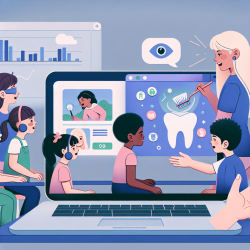Ensuring optimal oral health in children with special needs, such as those who are deaf, mute, or visually impaired, is crucial for their overall well-being. A recent study titled "Oral health status and treatment needs among deaf, mute and visually impaired children of Gulbarga district – A population based cross sectional study" offers valuable insights into the oral health challenges faced by these children and underscores the importance of targeted dental care interventions.
The study, conducted among 284 children aged 6-24 years, revealed some alarming statistics:
- 49.3% of the children had dental caries.
- 87.4% suffered from periodontal disease.
- 24.7% had poor oral hygiene status.
These findings highlight a significant gap in dental care and the urgent need for preventive and therapeutic measures. As practitioners focused on creating great outcomes for children, we can leverage these data-driven insights to improve our approaches and interventions.
Key Takeaways for Practitioners
1. Prioritize Preventive Care
The study underscores the importance of preventive dental care. Regular dental check-ups and cleanings, along with education on proper oral hygiene practices, can significantly reduce the prevalence of dental caries and periodontal disease.
2. Tailored Communication Strategies
Effective communication is vital when working with deaf, mute, and visually impaired children. Utilize visual aids, sign language, and tactile methods to convey oral health instructions clearly. Engaging parents and caregivers in the education process is also crucial.
3. Addressing Treatment Barriers
Understanding and addressing barriers to dental care, such as accessibility, cost, and fear, is essential. Collaborate with schools and community organizations to create accessible dental care programs and provide resources for families.
4. Conduct Further Research
While this study provides valuable insights, further research is needed to explore the long-term effectiveness of various interventions. Practitioners are encouraged to participate in or initiate studies that examine the impact of tailored dental care programs on the oral health outcomes of special needs children.
By integrating these strategies into our practice, we can make significant strides in improving the oral health and overall well-being of children with special needs. Data-driven decisions and targeted interventions are key to achieving these outcomes.
To read the original research paper, please follow this link: Oral health status and treatment needs among deaf, mute and visually impaired children of Gulbarga district – A population based cross sectional study.










